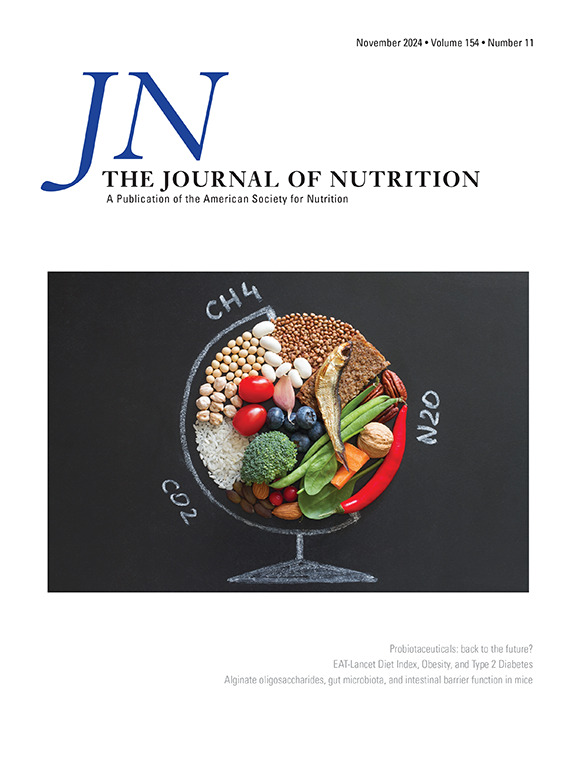高纤维素饮食通过调节小鼠肠道微生物群和代谢途径改善认知障碍。
IF 3.7
3区 医学
Q2 NUTRITION & DIETETICS
引用次数: 0
摘要
背景:营养是认知功能的关键因素,安全的饮食干预有望预防儿童精神疾病的认知障碍。我们之前已经证明,儿童社会孤立(SI)压力会影响结肠功能,导致认知障碍。纤维素是一种不溶性膳食纤维,对肠道健康有益,但其对认知障碍的潜在影响尚未得到探讨。目的:本研究探讨高纤维素饮食是否通过调节肠道菌群和代谢途径改善SI诱导的认知障碍。方法:C57BL/6J雄性小鼠(3周龄;n = 10-15只/组),随机分为2组:单笼(SI)组和每笼5只(群)组。每组接受正常饮食(5%纤维素)或高纤维素饮食(30%纤维素),每天5周,直到行为测试结束。我们评估了行为异常、肠道菌群组成和代谢物,并进行了双向方差分析。结果:摄入高纤维素饮食改善了认知障碍,包括在新物体定位测试(NOLT)中,SI小鼠在新位置花费的时间减少;+ 30%;P < 0.01),海马Iba-1阳性细胞小胶质细胞减少(-33%;P < 0.05)。高纤维素日粮显著影响了SI小鼠肠道菌群聚类图(P < 0.01),并增强了苹果酸-天冬氨酸穿梭通路的变化(P < 0.01)。值得注意的是,抗生素治疗后喂食高纤维素饮食的SI小鼠的粪便微生物群移植(FMT)复制了NOLT认知障碍的改善(+46%;P < 0.01)。此外,FMT复制了Iba-1阳性细胞的减少,表明海马小胶质细胞的激活受到抑制(-52%;P < 0.01),并增强了苹果酸-天冬氨酸穿梭通路的变异(P < 0.01)。结论:这些发现表明,高纤维素饮食可能通过调节肠道微生物群和代谢途径来改善儿科特异性认知障碍。本文章由计算机程序翻译,如有差异,请以英文原文为准。
High-Cellulose Diet Ameliorates Cognitive Impairment by Modulating Gut Microbiota and Metabolic Pathways in Mice
Background
Nutrition is a key factor in cognitive function, and safe dietary interventions are promising to prevent cognitive impairment in pediatric psychiatric disorders. We previously demonstrated that childhood social isolation (SI) stress affects colonic function, leading to cognitive impairment. Cellulose, an insoluble dietary fiber, shows benefits to intestinal health, but its potential impact on cognitive impairment has not been explored.
Objectives
This study investigated whether a high-cellulose diet ameliorates cognitive impairment induced by SI through modulation of gut microbiota and metabolic pathways.
Methods
C57BL/6J male mice (3 wk old; n = 10–15/group) were randomly divided into 2 groups: individually housed (SI) group and housed 5 mice per cage (group-housed) group. Each group received either a normal diet (5% cellulose) or a high-cellulose diet (30% cellulose) for 5 wk daily until the end of the behavioral testing. We evaluated behavior abnormalities, gut microbiota composition, and metabolites, and performed 2-way analysis of variance.
Results
Intake of a high-cellulose diet ameliorated cognitive impairment, including decreased time spent in a novel location of SI mice in novel object location test (NOLT; +30%; P < 0.01) with reduction of Iba-1 positive cells, microglia, in the hippocampus (–33%; P < 0.05). The high-cellulose diet indicated a significant difference in gut microbiota clustering plots (P < 0.01) and enhanced the variation in malate-aspartate shuttle pathways in SI mice (P < 0.01). Notably, fecal microbiota transplantation (FMT) from SI mice fed a high-cellulose diet after antibiotic treatment, replicated amelioration of cognitive impairment in NOLT (+46%; P < 0.01). Additionally, the FMT replicated a decrease of Iba-1 positive cells indicating suppressed hippocampal microglial activation (–52%; P < 0.01), and enhanced the variation in malate-aspartate shuttle pathways (P < 0.01).
Conclusions
These findings suggest that a high-cellulose diet may ameliorate pediatric-specific cognitive impairment through modulation of the gut microbiota and metabolic pathways.
求助全文
通过发布文献求助,成功后即可免费获取论文全文。
去求助
来源期刊

Journal of Nutrition
医学-营养学
CiteScore
7.60
自引率
4.80%
发文量
260
审稿时长
39 days
期刊介绍:
The Journal of Nutrition (JN/J Nutr) publishes peer-reviewed original research papers covering all aspects of experimental nutrition in humans and other animal species; special articles such as reviews and biographies of prominent nutrition scientists; and issues, opinions, and commentaries on controversial issues in nutrition. Supplements are frequently published to provide extended discussion of topics of special interest.
 求助内容:
求助内容: 应助结果提醒方式:
应助结果提醒方式:


